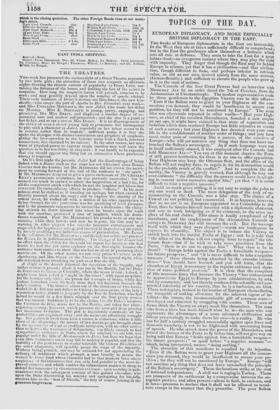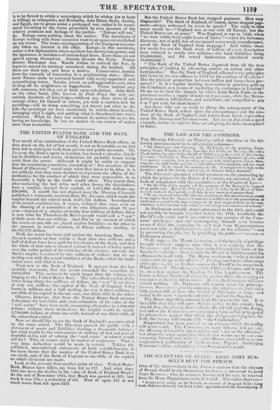TOPICS OF THE DAY.
EUROPEAN DIPLOMACY, AND MORE ESPECIALLY BRITISH DIPLOMACY IN THE EAST.
THE freaks of European diplomatists in the East are inscrutable. In the West they are at times sufficiently difficult to comprehend ; but in the East the gentlemen allow themselves a latitude which sets all rule at defiance. They seem to take the East for a groat lubber-land—an overgrown nursery where they may play the child with impunity. They forget that though the East may be behind Europe in science, yet that it has a civilization—and that civiliza- tion, though different in form, and perhaps inferior in intrinsic value, as old as our own, derived mainly from the same sources, (Grmeo-Semitic,) and sufficient to elevate the people who grow up in it to the rank of nations.
The Consuls of the four Great Powers had an interview with MEHEMET ALI by an order dated the 7th of October, from the Ambassadors at Constantinople. The modest representation made by these gentlemen to the Egyptian Viceroy was to this effect- " Even if the Sultan were to grant to your Highness all the con- cessions you demand, they would be insufficient to secure your position, for they will not be sanctioned by Europe." The same idea was afterwards repeated in other words—" Had your high- ness, as chief of the revolted Mussulmans, founded a new empire an age ago, it might have existed in that state of separation and isolation which then rendered Europe but little attentive to events of such a nature; but your Highness has devoted even your own ' life to the establishment of another order of things; and you have need, under pain of vanishing like a meteor, of the sanction of Europe—who will not sanction any thing that does not leave un- touched the Sultan's sovereignty." As it' such language were not in itself sufficiently absurd, it was employed after the Consuls had told MEHEMET AL!—" You can at this moment deprive the Porte of still greater territories, for there is no one to offer opposition. Your Highness may keep the Ottoman fleet, and the allies of' the Sultan will not employ force to regain it, for its destruction would be the probable result of the conflict." And to complete the ab- surdity., the Viceroy is gravely warned, that although he may not over-estimate " the difficulty that the powers would have in adopt- ing in ,Zoncert active measures against him," yet that " it is never difficult to take a negative measure."
Amid so much grave trifling, it is not easy to assign the pahn to any one word or deed. The mere delegation of the task of re- monstrating to the Consuls, was a false step. The duties of a Consul arc not political, but commercial. It so happens, however, that no socner is an European appointed to a Consulship in the East, than he limeies himself invested with a diplomatic character, and sets to work intriguing as if for existence, to the utter ne- glect of his real duties. This abuse is loudly complained of by merchants, and the employment of the Alexandrian Consuls as envoys to MEHEMET ALL will increase the evil. But the message itself with which they were charged !—words are inadequate to express its absurdity. The object is to induce the Viceroy to shrink back into the dutiful Podia of' Egypt ; and he is told that " the allies of the Sultan still not employ force to regain" the Ot- toman fleet—that if he wish to take more provinces from the Porte, " there is no one to oppose him." What then is he to dread ? " Europe holds against time Pacha a formidable weapon— his tUture prospects ;" and " it is never difficult to take a negative measure : " these threats being clenched by the oracular Ultima- tion—" You should have learned, and you will learn, that the situation of Egypt is necessary to the regular existence and dura- tion of some political position." It is clear that the compilers of this nonsense limey that because the Viceroy" has endeavoured to approximate Egypt to Europe by your administration, by arts, and by commerce, ''and has thereby esnifessed the scientific and eco- nomical inferiority of' his country, that he is a barbarian, an idiot. These red-tapists, trained in the routine of European chancelleries, are incapable of making allowance fbr the inherent vigour of in- tellect— the innate, the incommunicable gift of' common sense— developed and educated by struggling with events. These men of forms think the Viceroy an empty mask like themselves. The man who from a slave has made himself what he is—the man who can appreciate the advantages of' a more advanced civilization and labour perseveringly to make them his own—is a reality. Ile who has for half a century struggled successfully against open force and domestic treachery, is not to be frightened with umneanieg forms of speech. He who struck down the power of the Manteluas, and forced the banner of' the Porte to fly befbre him, will not give way on being told that Europe " bolds against him a formidable weapon— his future prospects ;" or quail before " a negative measure "— which, being interpreted, means, "doing nothing." The absurdity of this manifesto is equalled by its injustice. " Even if the Sultan were to grant your highness all the conces- sions you demand, they would be insufficient to secure your po- sition ; for they will not be sanctioned by Europe." Europe "will not sanction any thing that does not leave untouched the principle of the Sultan's sovereignty." These declarations strike at the root of national independence. A civil war is raging in Turkey. There are prospects of its settlement by a compromise between the an- tagonist parties; and alien powers—aliens in faith, in customs, and in laws—presume to declare that it shall not be allowed to termi- nate except in the manner that they prescribe. The poor Sultan is to be forced to retain a sovereignty which he wishes (or at least is willing) to relinquish; and .Rounielia, Asia Minor, Syria, Arabia, and Egypt, are to groan under a prolonged war, unless it be termi- nated according to the forms prescribed by men ignorant of the relative positions and feelings of the parties. "Europe will not," &c. Europe cares nothing about the matter. The merchants of Europe trading with those countries want to see peace reestablished on any terms. The home-staying portion of the European commu- nity takes no interest in the affair. Europe, in this manifesto, means a few diplomatists whom accident has thrown into power, and the ignorance or indolence of nations kept there. Even these are not agreed among themselves. Austria favours the Porte. France favours Mnulistrer Am. Russia wishes to embroil the fray, in hopes to extend its territory unnoticed during the hubbub. All these see their way, and have a motive. Conservative Austria fears the example of innovation in a neighbouring state : Move- ment France seeks to surround herself with newly-organized and sympathizing states. Russia, intent on self-aggrandizement, tries to keep all its neighbours at loggerheads. These nations may talk nonsense, but they act at least upon calculation. John Bull, on the other hand, (like LISTON in Paid Pry,) the only one entirely destitute of knowledge—without any clear views of ad- vantage either for himself or others, yet with a cureless itch for meddling—will be doing something, yet knows not what to do. Like the prototype we have mentioned, he whisks about heavily, deranging what is right, and putting what is disordered into worse confusion. What he does one moment he undoes the next ; for, having no knowledge, he has no motive to one course of action more than to another.



























 Previous page
Previous page